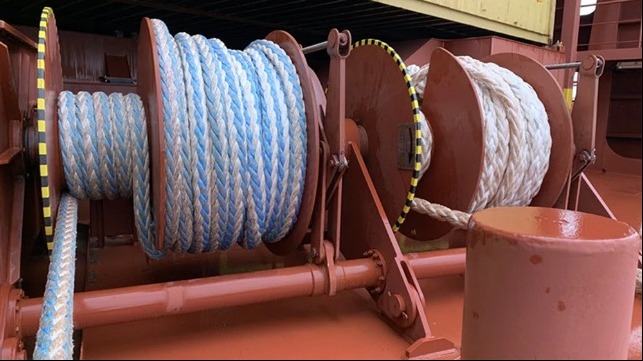New Rope Design Improves Vessel Mooring Safety

Mooring is one of the most dangerous aspects of port and vessel operations. When a mooring rope holding a docked vessel snaps, the abrupt energy release can cause the rope to whip across the dock and ship at a speed of almost 500 MPH or more than twice the speed of a NASCAR race car.
P&I Club, a U.K. marine insurer, released data that showed over half of all reported injuries over the past 20 years occurred during mooring. The data showed that 40 percent of serious accidents were due to lines breaking or tightening unexpectedly with an estimate that seafarers had a one in four chance of losing a limb and one in seven chance of death from a rope accident.
Alarmed by statics like these, shipping giant Maersk will begin implementation of an innovation called Snap Back Arrestor (SBA) ropes on the mooring lines used to hold vessels in place while docked in port for loading and unloading.
Working closely with suppliers to solve this industry challenge, Maersk reports that it chose a Norwegian-based manufacturer called TIMM ROPES that offers new mooring rope technology that features a special core that elongates more than the surrounding rope, acting to absorb and dampen the tremendous energy released when mooring ropes break while under strain. As a result, instead of snapping back in unpredictable ways at great speed, a broken SBA rope will simply drop to the ground. The new ropes are also colored with a Maersk blue color stripe, making it easier for operators to spot any damage or twists in the rope that could affect breakage. Maersk says that this is another important visual feature developed to enhance the safety of people working in our industry.
Once the SBA concept was verified by snap tests, several Maersk vessels were enrolled in a nine-month pilot project in 2019 to ensure the rope’s operational conditions, alongside traditional mooring ropes, using vessels of various sizes. As part of the testing, they ensured the standardization of the new SBA mooring rope sizes and compatibility with existing mooring designs.
“This SBA rope technology embraces one of the fundamental elements of our “Safety Differently approach, by building in capacity to safeguard people,” said Aslak Ross, Maersk’s Head of Marine Standards.
Each year Maersk buys and replaces some 1,000 mooring ropes – an annual expense of nearly $2 million. Maersk will be implementing an exchange program in which their current mooring ropes will be replaced at the end of their 5-year lifecycle with SBA enhanced ropes and Maersk anticipates that full fleet implementation of the new SBA ropes will be completed within five years.

that matters most
Get the latest maritime news delivered to your inbox daily.
“This new technology and innovative approach enables us to safely transform the mooring rope approach in our industry and help lead by example to protect our seafarer community and our dockworkers ashore,” added Ross.
